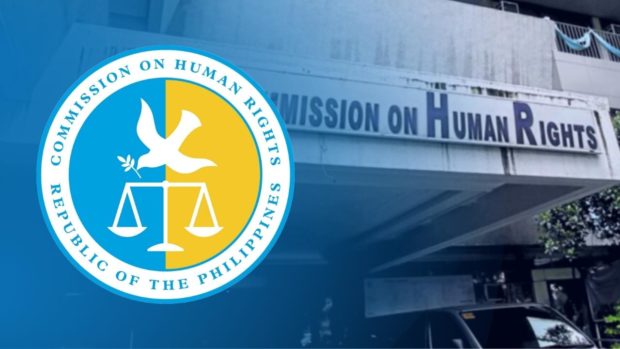
Commission on Human Rights INQUIRER FILE PHOTO
The presence of children during a supposed buy-bust should have guided law enforcers to proceed with caution and inhibited them from firing their weapons, the Commission on Human Rights (CHR) said in a report on a 2019 drug operation wherein a 3-year-old girl was shot dead.
The CHR also noted that the Philippine National Police refused to cooperate with its investigation and provide documents requested by the commission.
The 24-page report on the June 29, 2019, buy-bust operation in Rodriguez, Rizal province, was dated Dec. 2 last year, well after the drug war of former President Rodrigo Duterte, and released only on Friday.
The basis of the CHR’s findings were police reports on the sting, conducted that morning at the residence of drug suspect Renato Ulpina in Metro Manila Hill Subdivision.
Four officers were involved in that operation and were later named respondents—Police Cpl. Mark Jherson Olaño, Staff Sergeants Fortunato Jiro III and Ederico Edrick Zalavaria, and their boss, Lt. Col. Resty Damaso, then police chief of Rodriguez.
‘Missing facts’
Another officer—Senior Master Sgt. Conrado Cabigao, who posed as a buyer of crystal meth or “shabu”—died in that operation. So did Enrique Cahilig, a companion of Ulpina, and Kateleen Myca Ulpina, the drug suspect’s 3-year-old daughter.
According to the police reports cited by the CHR in its findings, it was Cahilig who sensed that Cabigao’s transaction with Ulpina was a buy-bust.
Ulpina then fired his gun “and picked up and used [his] daughter as ‘shield,’ as the police officers returned fire,” said the police, as quoted by the commission.
The CHR, however, noted in its conclusions that the police omitted the presence of Kateleen’s four siblings—the other children in the Ulpina home—as well as their mother, Lydjay, Renato’s wife.
Lydjay would later recall to the commission the police coming across her and the children as they made their way out of the house.
“Glaringly, these facts were missing from the police reports obtained in this case,” the CHR said. “The presence of these children could have also alerted the respondents and somehow discouraged them from firing their guns and thus prevented the loss of lives during the incident.”
‘Doubtful’ buy-bust
As for the police account of Renato Ulpina using his daughter Kateleen as “shield,” the CHR said the police could have exercised caution in dealing with what they claimed had happened.
“Based on the foregoing, this office finds that the right of life of [Kateleen] was obviously violated in this case by the respondents,” the commission said.
But regarding Renato Ulpina’s death, the CHR said that there was “no doubt” that he was killed in a gunfight “when he tried to evade arrest.”
Still, it concluded that his killing could be classified as a human rights violation.
The commission even questioned the buy-bust itself as being “doubtful.”
Lydjay Ulpina, as well as other witnesses in her neighborhood who were interviewed by the CHR, said there was no buy-bust involving Renato other than the police visit.
The commission said there was “merit” to Lydjay’s claim. But this, it said, could not be supported by the other witnesses since they refused to execute affidavits “for fear of possible reprisal.”
The report was released by the CHR Calabarzon office and was signed by Edgar de Luna, chief of the regional office’s investigation division, and lawyer Diana Samaniego-Gamo of the office’s legal division.
The agency recommended financial assistance of P10,000 each to the “legal heirs” of the four fatalities—Cabigao, Cahilig, and Renato and Kateleen Myca Ulpina.
‘Shit happens’
The case drew public attention in 2019 after a minor was counted among the fatalities. Right after that incident, the CHR formed a fact-finding team.
The ensuing controversy over that police operation was compounded by Sen. Ronald dela Rosa’s remarks, describing that incident as “shit happens.”
Dela Rosa, as Duterte’s first PNP chief, was the top enforcer of the drug war.
The International Criminal Court (ICC) on March 28 said it was maintaining its investigation into the drug war as it rejected the Philippine government’s appeal to halt that probe.
This prompted President Marcos, in turn, to declare that the Philippines would no longer appeal its case and would “disengage from any contact” with the ICC.
RELATED STORIES
SolGen: Philippines will pursue drugs war appeal with ICC

